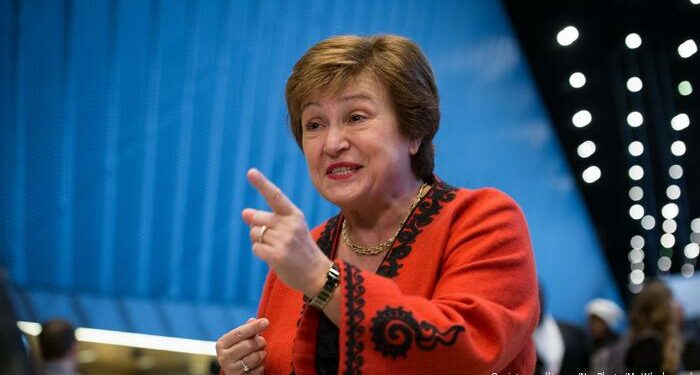IMF’s Georgieva Outlines Drivers of Global Economic Resilience Amid Rising Uncertainty
The Managing Director of the International Monetary Fund (IMF), Kristalina Georgieva, says the resilience of the global economy in the face of mounting uncertainty stems largely from strengthened institutions, robust private sector adaptability, and sound policy frameworks implemented by many countries in recent years.
Speaking at a press briefing on Thursday, October 16, 2025, on the sidelines of the IMF/World Bank Spring Meetings, Ms. Georgieva noted that despite challenges posed by geopolitical tensions, technological disruptions, demographic shifts, and evolving trade dynamics, the global economy has “held up remarkably well.”
“Countries have strengthened their institutions, built policy credibility, and improved market efficiency — and this is paying off,” she stated. “The adaptability of the private sector in navigating uncertainty is quite remarkable.”
However, Ms. Georgieva cautioned that the overall outlook remains “underwhelming,” pointing to subdued medium-term growth prospects, record-high public debt, and growing global imbalances. “The global economy is becoming less predictable, and this unpredictability is impacting people — they are taking to the streets to demand better opportunities,” she said.
Policy Priorities for Member Countries
Outlining the IMF’s global policy agenda, the Managing Director urged member countries to undertake structural reforms that encourage innovation, entrepreneurship, and sustainable growth.
“To thrive, countries must take reforms. I have encouraged our members to embrace a regulatory house cleaning to help foster innovation and private enterprise,” she said, adding that reforms should be anchored in “strong institutions, free and fair markets, and a stable macroeconomic environment.”
Ms. Georgieva also underscored the need for countries to secure sound macroeconomic fundamentals to navigate what she described as a “more turbulent world.” On fiscal policy, she advised governments to rebuild fiscal buffers and reduce debt by relying more on domestic revenue mobilisation.
“Countries must spend less on industrial policy and more on reducing deficits. Notably, the United States needs to reduce fiscal deficits,” she said.
IMF’s Commitment to Stability and Support
Reaffirming the IMF’s role in supporting member countries, Georgieva disclosed that the Fund is currently undertaking a comprehensive review of its surveillance framework to provide improved policy advice on trade, domestic reforms, and debt sustainability.
“We have in motion a comprehensive surveillance review, including our advice on trade policies and domestic reforms to rebalance economies,” she said, adding that the Fund is also reviewing its conditionality policies to better assist countries in addressing balance of payment challenges.
She further highlighted efforts to strengthen financing support to low-income countries through the implementation of the Poverty Reduction and Growth Trust (PRGT) reforms and called for renewed funding for the IMF’s Catastrophic Containment and Relief Trust (CCRT), which she said was depleted after providing debt relief during the COVID-19 pandemic.
On sovereign debt, Ms. Georgieva disclosed that discussions continue under the IMF’s Global Sovereign Debt Roundtable to enhance coordination between creditors and debtor nations and to review the debt sustainability framework for low-income countries.
Commitment to Member Countries
Concluding her remarks, Ms. Georgieva reaffirmed the Fund’s commitment to remain a “prudent steward” for member nations as they navigate global challenges.
“We will continue to help our countries pursue the opportunities in front of them. As a prudent steward, we are going to be right there for them every step of the way,” she said.








